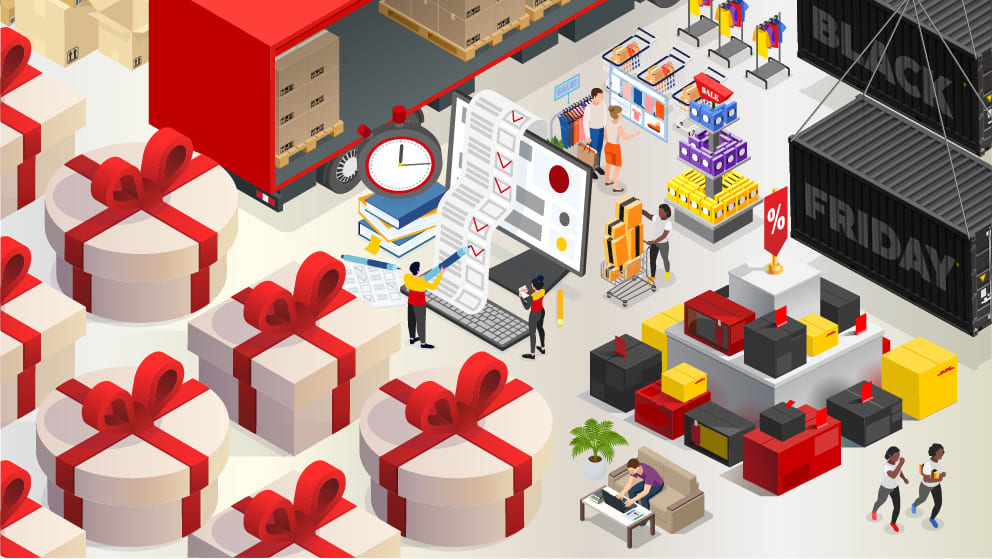THIS WEEK’S AOB LOOKS AT THE LATEST E-COMMERCE NEWS FROM AROUND THE WORLD, INCLUDING AMAZON’S NEW DISCOUNT HUB, AND WHY CONSUMERS TURN TO “LITTLE LUXURIES” IN TIMES OF FINANCIAL STRESS.

Retail giant unveils savings hub to help those on a budget
As the cost-of-living crisis continues to impact consumers, Amazon has launched a dedicated hub of its affordable shopping features. “Amazon Access” allows customers to browse special discount programs in one place, including coupon shopping, and Amazon Layaway, through which they can reserve selected items for just 20% of the total cost and pay the rest over time. There is also a subscription service offering savings on thousands of everyday products.
Eligible customers – such as government assistance recipients – will qualify for Prime membership for just US$6.99 per month (instead of $14.99 per month) too.
“Given the tough economic climate with many facing rising costs on essential needs, we want our customers to know about all the accessible offerings available on Amazon, no matter their circumstances,” a spokesperson said1.

Out of stock? You can still make the sale
French start-up Stockly2 has completed another round of funding as it continues to grow. The company pools together the inventories of several e-commerce websites so that when a retailer is out of stock, it can continue selling by shipping the products from other authorized brands in the network.
The company’s software integrates with clients’ inventories, and fills in the gaps in real time. The out-of-stock brand – or “demander” in Stockly terms – doesn’t have to disappoint customers, whilst the supplier who fulfilled the order shares some of the profit. The supplier is encouraged to use neutral packaging so that the end customer doesn’t know any different.
Currently partnered with over 400 retailers in Europe, covering 50 million items, Stockly will use its latest funding to employ more staff and sign more retailers.

Leading retailer trials paid returns
H&M has become the latest well-known brand to begin charging for returns – albeit on a trial basis. “We are testing it as a possible measure we could take, all depending on how the customers react,” H&M’s CEO Helena Helmersson recently told Bloomberg3.
The global fashion retailer will trial paid returns in Norway and the UK as it battles inflation-driven currency effects across its business. “There’s still quite a lot of uncertainty, but [inflation] looks like it has peaked and is slowly but surely leveling out. The biggest factor affecting us going forward is the US dollar.”
Returns are a long-standing, expensive headache for online retailers, with around 30% of all orders returned4. For clothing brands, it’s even higher. Recently, H&M’s leading competitor ZARA began charging customers for returns in a move which caused controversy amongst customers.
Are returns impacting your e-commerce business’ profits? Check out our dedicated guide for 5 ways to reduce your returns rate and start saving!

Fed up consumers treat themselves amid recession
Holiday budgets will be stretched this year, with many consumers planning to start their Christmas shopping earlier than last year in a bid to reduce the impact. But is it all about the discounts? Consumer psychologist Dr Cathrine Jansson-Boyd recently spoke to the BBC5 about the theory that sales of affordable luxuries rise in economic downturns.
"Being short of money is psychologically daunting for people and the way to make yourself feel better, even if it's ever so little, is to purchase something that you think will cheer you up," she said.
Consumers not having as much money leads to irrational choices such as impulse purchases. These items are “not purchased for the practicality of them. They're actually bought because they represent some sort of symbolic value […] to represent who they are.”
"People look at what you wear, what brands you have, what car you drive, and the handbag you use, even the suitcase you have, and we made judgments – we're not aware of making judgments because it happens subconsciously."

Online sellers remain optimistic despite economy
According to a new report from customer support solution eDesk6, although over 80% of online sellers believe a recession is pending, 53% still expect to see an increase in online shopping over the next six months. That said, 54% do plan to raise their prices over the same time to negate the impact of rising business costs.
Amidst this, e-commerce businesses should be prioritizing customer service as the key to driving growth, a spokesperson from eDesk said7. “As sellers think of the future and adding more sales channels to increase their customer base, they must ensure that they have all their customer information in one place and easily accessible.”
“eDesk Customer View provides brands with a streamlined and easily accessible view of all customer interactions and their previous purchase information in one place, making life easier for agents and creating a much better customer experience.”
1 - Amazon spokesperson, TechCrunch, October 2022
2 - Stockly
3 - Helena Helmersson, Bloomberg, September 2022
4 - Invespcro, May 2022
5 - Dr Jansson-Boyd, BBC, September 2022
6 - eDesk report, Charged Retail, October 2022
7 - eDesk spokesperson, Charged Retail, October 2022

























